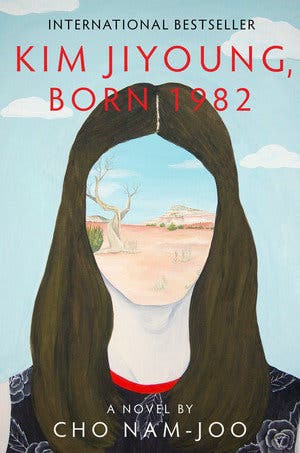KIM JIYOUNG, BORN 1982
By Cho Nam-Joo
I hated reading “Kim Jiyoung, Born 1982,” the debut novel by Cho Nam-Joo, which is the opposite of saying that I hated the book itself. The story of a young stay-at-home mother driven to a psychotic break, it laid bare my own Korean childhood — and, let’s face it, my Western adulthood too — forcing me to confront traumatic experiences that I’d tried to chalk up as nothing out of the ordinary. But then, my experiences are ordinary, as ordinary as the everyday horrors suffered by the book’s protagonist, Jiyoung. This novel is about the banality of the evil that is systemic misogyny.
Upon its publication in South Korea in 2016, the book, which sold more than a million copies, had an “Uncle Tom’s Cabin” effect, propelling a feminist wave. It’s easy to see why.
The novel begins with Jiyoung having a dissociative episode. One day she wakes up not as herself but, to her husband’s horror and confusion, as her mother — speaking and acting just as her mother would. Another day she claims to be a schoolmate who died in childbirth the previous year. As her psychiatrist later puts it: “Jiyoung became different people from time to time. Some of them were living, others were dead, all of them women she knew. No matter how you looked at it, it wasn’t a joke or prank. Truly, flawlessly, completely, she became that person.”
We eventually learn about the event that triggered Jiyoung’s descent into madness. On her last day as a woman in her right mind, she is sitting by herself on a park bench when a group of young office workers mock her for having the audacity to drink a cup of coffee in the middle of the day on her husband’s dime. They call her a “mum-roach” — a pejorative expression for an entitled woman of leisure.
In the original Korean, Cho uses the term mum-choong, which isn’t quite “mum-roach”: The suffix choong is more generic, something like “creepy-crawly.” But I like the translator’s word choice; “roach” is redolent of Kafka’s “The Metamorphosis.” Jiyoung, like Gregor Samsa, feels so overwhelmed by social expectations that there is no room for her in her own body; her only option is to become something — or someone — else.
Of course, Jiyoung’s metamorphosis wasn’t brought on by any single incident. The seeds of her discontent were planted before she was born; she and her sister exist only because her parents kept having children (and one sex-selective abortion) until they finally produced a son. While the son gets the best of everything, Jiyoung and her sister are treated as failed rough drafts.

Jiyoung’s life doesn’t get easier in adulthood. At her job at a marketing agency, she finds she can’t even order food without mockery. When lunching with colleagues, she orders an inexpensive dish — soybean paste with rice — prompting a male client to call her a doenjangnyeo, literally a “bean paste woman.” This snide colloquialism refers to an uppity young woman who eats the cheapest possible meals in order to save up for Prada handbags and the like.
Even when she marries, quits her job and succeeds in producing a son, Jiyoung feels overwhelming social pressure to be a sufficiently loving mother, which she likens to “religious dogma.” Her husband is supportive, but this almost makes it worse: He wants to help, but can do nothing.
The husband’s helplessness is a deft touch on Cho’s part, and makes an important point: If even a man can’t fight a man’s world, what’s a woman in Jiyoung’s position to do?
Like “The Metamorphosis,” Cho’s novel is written in an unemotional, almost clinical style; by the end we realize it’s a case history narrated by Jiyoung’s male psychiatrist. It even includes footnotes to actual studies on gender inequality in South Korea.
At first, the footnotes were distracting. Then I realized their purpose was to suggest the degree to which the travails of Jiyoung, a fictional character, are grounded in fact. It’s South Korea’s dirty little secret that, despite its prosperity, technological advances and coolness factor, when it comes to gender equality, it’s no Finland. As the novel points out, the Korean hoju system, in which children were registered exclusively under the patriarchal line, was not abolished until 2008. The consequences of this practice were serious: An illegitimate child was a legal nonentity, like an unbaptized child under old-school Catholic dogma.
Of course, it’s not just in Korea that such problems occur, which may be why “Kim Jiyoung, Born 1982” has been translated into more than a dozen languages and has become an international sensation. In South Korea, the book’s release led to a powerful backlash. When the K-pop singer Irene, a member of a band called Red Velvet, said in a March 2018 interview that she’d read the book, irate male netizens took to social media to announce they were burning her photo.
Perhaps the novel’s international exposure will force South Korea to have another reckoning with what it plans to do about its biggest elephant in the room. I expect threats just for writing this review.
 EU News Digest Latest News & Updates
EU News Digest Latest News & Updates



